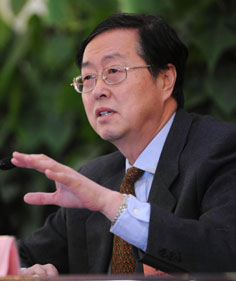PBOC chief treads with caution on interest rates
By Dong Zhixin (chinadaily.com.cn)
Updated: 2008-03-06 12:17
Updated: 2008-03-06 12:17
China's top banker refused to rule out the possibility of further interest rate hikes on Thursday, while pledging to be cautious in using this monetary tool.
"There is definitely room for further increases, in my personal opinion," said Zhou Xiaochuan, the central bank chief during a press conference on the sidelines of the annual session of the country's top legislature.
 Zhou Xiaochuan, governor of the People's Bank of China, answers questions during a press conference in Beijing, March 6, 2008. [Xinhua] |
However, regulators have to weigh the pros and cons before taking such a move, Zhou said. "The timing and the scale of the adjustment are also critical factors to consider."
Zhou admitted that the recent aggressive rate cuts in the United States are restricting his agency's ability in raising the cost of capital.
The two countries' interest rates moving in opposite directions is expected to attract more hot money into China, complicating the country's efforts to keep its economy from overheating and tame inflation.
"This is just part of the factors, and we also have domestic considerations," he said, pointing to the boost of domestic consumption and the development of the capital market.
China has been encouraging its people to spend more so as to reduce its over-reliance on investment and exports for economic growth.
"We have to consider and measure the impact of interest rate changes on domestic demand," Zhou said, adding that regulators hope to cut the savings rate, which remains high in the country. In theory, a lower interest rate will help push Chinese citizens to increase consumption.
Interest rate policies will also affect the development of the capital market, as well as the proportion of direct financing, Zhou added.
When interest rates are low, people tend to look to the capital market for attractive products, thus helping adjust the proportion between direct and indirect financing, Zhou said. "The country should increase its efforts in developing the capital market and encourage direct financing."
Premier Wen Jiabao pledged to follow a tight monetary policy on Wednesday in his policy speech to keep inflation in check and prevent the economy from overheating.
The Consumer Price Index, a barometer of inflation, jumped an 11-year high of 7.1 percent in January due to rocketing food prices. The world's fourth largest economy expanded 11.4 percent last year, the sixth consecutive year of double-digit growth.
In response, the central bank raised interest rates six times and the bank reserve requirement 11 times since the start of 2007.
Zhou saw only limited direct impact on China's financial institutions by the sub-prime crisis across the Pacific which, he believes, has yet to bottom out. He was confident that China is unlike to suffer a similar crisis as the overall quality of the housing credit is good.
The central banker said the rate cuts by the Fed to avert a possible economic recession in the United States may add to the excessive liquidity in the global market, which in turn might affect China’s monetary policies.
|
|
|
||
|
||
|
|
|
|